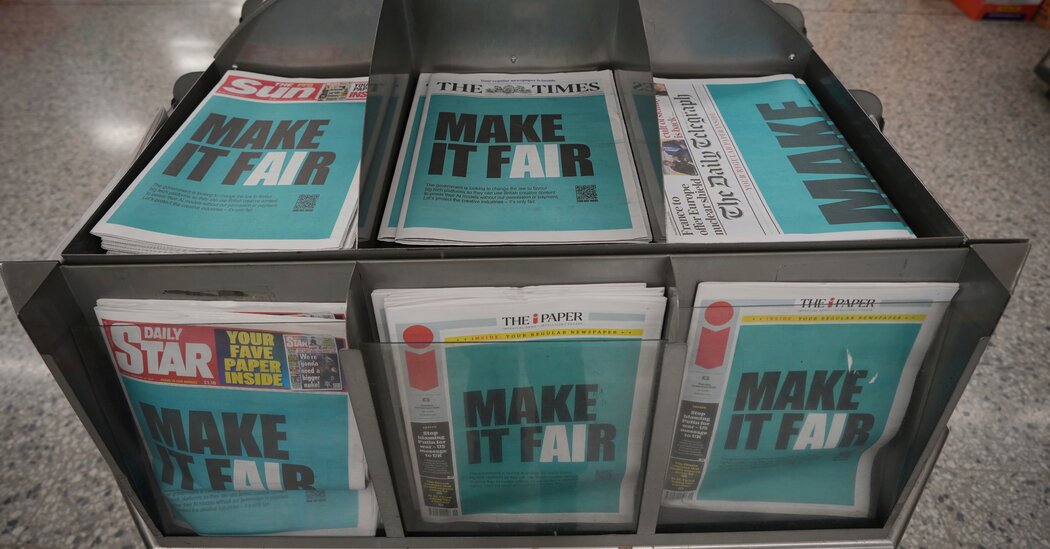Sometimes, silence speaks louder than song.
That’s the hope, at least, for more than 1,000 musicians who released a lyric-less album on Tuesday to protest the British government’s proposal to expand the ways that developers can use copyright-protected works to train artificial intelligence models.
The album, which was created by artists including Annie Lennox, Billy Ocean, Hans Zimmer and Kate Bush, is not exactly silent: It features recordings of empty studios, which the artists say represent “the impact we expect the government’s proposals would have on musicians’ livelihoods.”
There are footsteps and rustles — is that a door closing? a page turning? a fly? — but only the most out-there contemporary composers would refer to the sounds as songs.
“Doesn’t that silence say it all?” Kate Bush, who contributed to the album, said in a statement, adding, “If these changes go ahead, the life’s work of all the country’s musicians will be handed over to A.I. companies for free.”
Under the government’s proposals, artists would have to opt out, or “reserve their rights,” to keep their works from being used to train A.I. The window for public comments on the proposal, which is part of a broader government consultation on copyright and artificial intelligence, was set to close Tuesday night.
“Opt-out shifts the burden of controlling your works onto the rights holder,” said Ed Newton-Rex, who organized the album and is the chief executive of Fairly Trained, a nonprofit that certifies generative A.I. companies for the training data they use.
“Basically,” he said, of the current government proposal, “it flips copyright on its head.”
Even as some artists experiment with artificial intelligence, many fear that developers are inappropriately using their work without compensating them. (Publishers and journalists are also concerned: The New York Times has sued OpenAI and Microsoft for copyright infringement of news content related to A.I. systems. OpenAI and Microsoft have denied those claims.)
The album — titled “Is This What We Want?” — has 12 songs, each of which has a one-word title that together spell out the sentence: “The British government must not legalize music theft to benefit A.I. companies.”
Only some of the artists who were part of the album project directly contributed to the audio, Mr. Newton-Rex said, although he said that all shared in the credits.
Mr. Newton-Rex and other critics fear that artists may not even know if their work is being used to train the A.I. models. He said that he had previously run opt-out schemes at generative A.I. companies, which he called an “illusion,” in part because copyrighted work can spread so quickly online that creators can lose control of it.
Powerful A.I. developers have repeatedly shown that they are willing to skirt copyright law to train systems. And Britain, desperate to revive its sluggish economy, is aggressively trying to court A.I. developers. Prime Minister Keir Starmer recently said he plans to push Britain to be “the world leader.”
The country has already signaled its willingness to break with the European Union and some of its other allies, like Australia and Canada, in its attitude to the technology. At a recent A.I. summit in Paris, Britain sided with the United States in declining to sign a communiqué calling for A.I. to be “inclusive and sustainable.”
Now, Britain is arguing that a “competitive copyright regime” is part of what is needed to “build cutting-edge, secure and sustainable A.I. infrastructure.” The proposals, which were announced late last year, call the current system unclear and say that it is hampering innovation for both A.I. developers and artists. Britain argues that the proposed changes are meant to give artists more control over the way their work is used and more opportunities for payment.
In response to a request for comment, the Department for Science, Innovation and Technology said that Britain’s current copyright structure is holding both artists and A.I. companies back from full innovation. But it also noted that no decisions had been finalized and that it would consider the responses it received before setting out next steps.
Britain’s consultation process, in which the government asks for public input at the early stages of policy proposals, is designed to take in feedback and often leads to revisions.
As the consultation period ended on Tuesday, British artists and publishers released a series of protests. Several newspapers featured identical campaign images across their front pages that read: “Make it fair: The government wants to change the U.K.’s laws to favor big tech platforms so they can use British creative content.”
The musicians Paul McCartney, Elton John and Dua Lipa, the novelist Kazuo Ishiguro and the actor Stephen Fry were among the artists who signed a letter in protest that was published in The Times of London.
“There is no moral or economic argument for stealing our copyright,” the artists wrote. “Taking it away will devastate the industry and steal the future of the next generation.”


